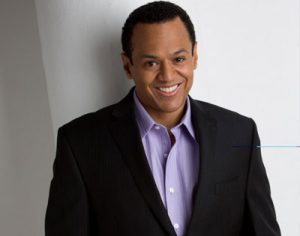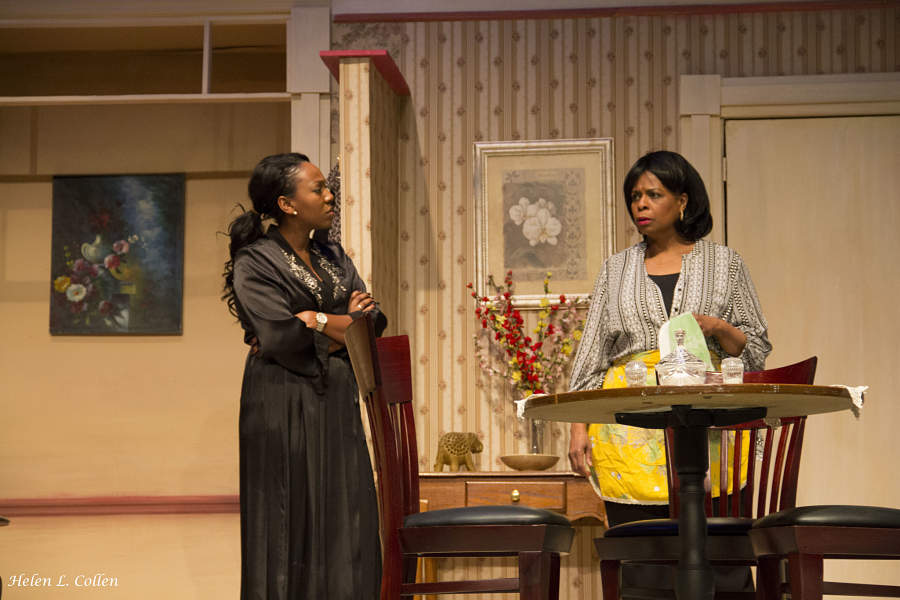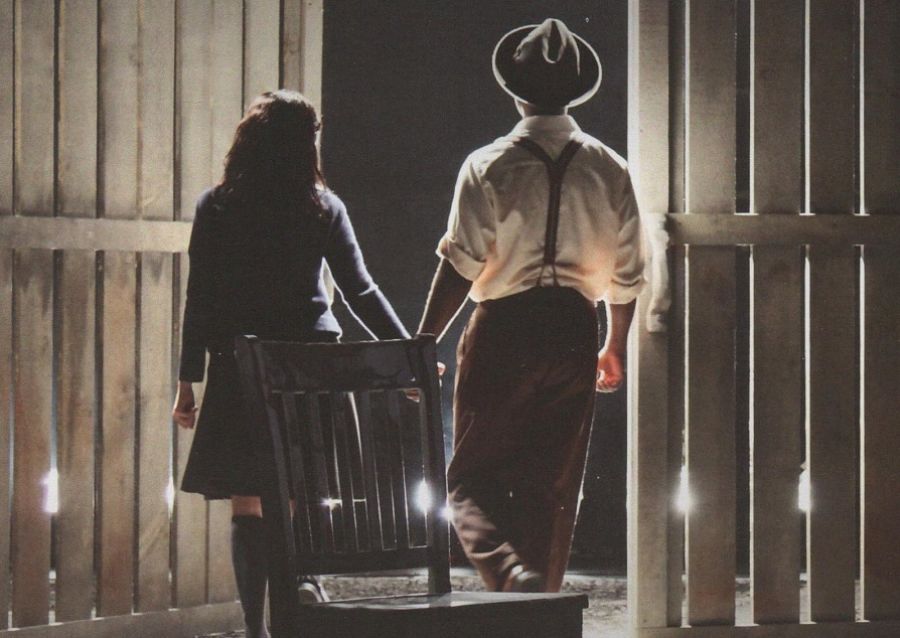Audiences at the biennial National Black Theatre Festival in Winston-Salem, N.C., this summer may marvel at how much it still resembles the vision of its founder, Larry Leon Hamlin, who died in 2007. Thanks in large part to the steady hand of his widow Sylvia Sprinkle-Hamlin, who became executive producer after his death, the festival (which runs July 31-Aug. 5) expects to draw 65,000 visitors to see 125 performances of 35 shows at 20 venues. But on the second night of the festival, a select few will also take part in an event that heralds the introduction of a new presence: Jackie Alexander.

Alexander was hired last year as artistic director of both the festival and of the North Carolina Black Repertory Company, the organization behind the festival. While the festival has flourished, the theatre itself had become the forgotten older sibling. Alexander has already breathed new life into the NCBRC with his 2016-2017 season, for which he’s directed all three plays, including one of his own and a world premiere. At his first festival, Alexander’s footprint will be smaller, but his signature will be on a special meet-and-greet on the second night, which will bring together playwrights with directors, artistic directors, and commercial producers, including Broadway producers Stephen C. Byrd—the kinds of folks who might lead to future productions down the line.
“The week should be about more than just seeing all the plays,” Alexander says. “I want a place where everyone in the room can connect. My whole career has been based on someone saying, ‘You should give this guy a shot.’”
That’s certainly in keeping with Hamlin’s original vision, which was to build a national sense of community for black theatre. Hamlin founded the NRBRC in 1979 as the state’s first black theatre. A decade later, aided by Maya Angelou, who served as his chairwoman, Hamlin launched the festival. His opening night honored August Wilson and Oprah Winfrey, both of whom were in attendance. Others who’ve appeared or performed through the years have included Denzel Washington, Ruby Dee, and Lou Gossett Jr., who is returning this year to receive the Sidney Poitier Lifetime Achievement Award.
The first festival drew 17 theatre companies and an audience of 10,000, and the festival kept growing, but after Hamlin’s death the NRBRC lost momentum. In recent years it has staged just one original show and one imported show per year apart from its annual Black Nativity production.
“Jackie brings a wealth of knowledge about theatre as a producer, director, and playwright,” says Lawrence Evans, who has been involved with NCBRC since 1982 and serves celebrity coordinator for the festival. “He’s committed and had a vision for this season.”
Alexander, who has directed plays at the festival four times since 2005, didn’t have a career path mapped out that included overseeing a theatre and a festival, or directing a film or writing a novel, which he has also done. “I never set out to do those things; I just do whatever comes my way,” he says.
Alexander, 50, grew up in New Orleans, playing trumpet and sports (“Basketball was my favorite but I was a better baseball player,” he says). He started taking acting classes at Louisiana State University, and, since he always dreamed of living in New York, decided to move on to the American Academy of Dramatic Arts. “I discovered I loved acting and I had some talent,” he said. He lived in Los Angeles for a time doing commercials, then returned to New York to act in theatre. That was his career path until he “fell into writing” in 1999.
It was after the inexcusable police shooting of Amadou Diallo, an unarmed immigrant in New York, that Alexander got his call to action. He was working on jazz musican’s Weldon Irvine’s protest album, The Price of Freedom, and Irvine had heard Alexander lamenting Diallo’s murder. Irvine’s advice, he recalls: “If you don’t like the stories being told about black people, stop whining and create your own.”
So Alexander sat down to write, not for the stage but for the screen. To get his 2002 film, Joy, made he tackled a new challenge, directing. “I was very proud of it, but I had to sacrifice a lot to get it made—there were almost 20 pages of script we couldn’t shoot and I had to edit around it,” he says. “Happenstance” again intervened, as the film led to phone calls offering him a chance to try his hand at directing theatre. He seized the opportunities and then, he says, “A lot of people called me to direct.”
Marjorie Moon, executive director of the Billie Holiday Theatre in Brooklyn, saw the film and encouraged Alexander to write a play. He wrote The Desire, set in the aftermath of Hurricane Katrina, then wrote another play and another, until he had a half-dozen plays produced. The High Priestess of Dark Alley was staged at NCBRC in 2010. By the time Brother From the Bottom, starring fellow New Orleans native Wendell Pierce (The Wire, Treme) debuted at the Billie, Alexander had also taken on the role of artistic director there. But when the Billie temporarily closed its theatre for renovation, Alexander decided to move on, directing Brothers from the Bottom and other plays in New Orleans.
Then he got tapped by the NCBRC. “I was dumbfounded when I got the call,” he says. “The opportunity to really run the theatre and the festival was something I never dreamed possible. I couldn’t think of a better opportunity.” What’s more, Winston-Salem “really is growing with a lot of new blood, so it seems like a good time to be there.”
Alexander laid out his ambitions for the board, the idea of staging new works, including a world premiere, in addition to a classic each season and bringing in (and housing) several Equity actors from New York for each production. “They were committed and accepted taking some losses to reestablish ourselves and garner attention,” he says.
The city and county, which have benefited greatly from the festival over the years—Alexander says the city’s economy nets about $10 million per year as a result, not counting ticket sales—have also stepped up to provide support for the new theatre season.

But the biggest thrill for Alexander is having the chance to provide opportunities for writers, especially emerging ones, both at the theatre and in the festival.
“I know so many writers here in New York with wonderful plays that didn’t get produced or that weren’t done on the level they’d wanted,” he says. For his first season, those writers were Angelica Cheri, whose play The Sting of White Roses had its world premiere at the theatre and will also run at the festival, and Cheryl Davis, who contributed Maid’s Door, and whose play Swimming Uptown will be a world premiere next season. “I’d never been there before but I felt so supported and I didn’t want to leave, so I’m ecstatic to be going back already,” Cheri says.
Alexander also hopes to provide opportunities for the many directors he knows. But because his hiring came relatively late and he had commitments in New Orleans that left him just three months to plan a season, he decided to direct Cheri’s and Davis’ plays, as well as his own The Right Reverend Dupree in Exile. Cheri, who had worked with him at the Billie, isn’t complaining. “He asks the best questions and he’s relentless,” she says. “I needed that—he pressed me to make decisions about why things would happen the way they do.”
For the new artistic director, the role of a theatre and its path to success begins with the plays—but it doesn’t end there, Alexander says. He has immersed himself in Winston-Salem, helping to land new sponsors and creating a sense of community with an innovative approach for the first season. Cheri’s play deals with breast cancer, his play involves ALS, and Davis’s characters confront Alzheimer’s Disease. So for each production, Alexander teamed up with an outside health organization to connect people to resources and to discuss the issues during talkbacks.
“We wanted to introduce the theatre back to the community with the idea that it serves the community,” Alexander says. “You need evenings where people just come to the theatre and laugh too, but if we can we want to educate and entertain at the same time. I think it’s something other theatres should try when it’s appropriate to the play.”
Cheri hadn’t thought about those issues while writing her play—her mother died of breast cancer before Cheri was a year old, so her play “was about my personal healing, not a vehicle for breast cancer awareness.” Yet when she saw Alexander’s plan, she says, “I was 150,000 percent behind it. I really stand behind this mission. I wouldn’t say to other theatres, ‘You must do it,’ but I don’t know of a theatre that isn’t looking for ways to reach people and this is an empowering outreach tool.”
During the play’s run in the festival, Alexander notes, there’ll be a mammography unit downtown, with booths set up to reach out not only to theatregoers but to anyone passing by.
Next season will bring another unusual collaboration—although what’s surprising is the mere fact that it is unusual. The NCBRC shares its space with the Little Theater, the oldest theatre in Winston-Salem, yet they’d always had an imaginary wall between them. That theatre’s new executive director, Connie Quinn, also started last year too, and Alexander says both newcomers brought a fresh perspective.
“It seems like an obvious partnership to both of us,” Alexander says. “We wondered why it hadn’t been done before.” They started by discussing the sharing of mailing lists and ended up deciding to collaborate on a production of Dreamgirls next season.
Due to his late selection, Alexander played more of a supporting role in the festival; the process of sifting through the 135 submissions from around the world (including England, Canada, and South Africa) had begun before he arrived. “At the next festival I will have more input on what we go after,” he says, “and I might say, ‘Let’s change up the formula.’”
This time around, though, he relied on Mabel Robinson, NCBRC’s previous artistic director, and the rest of the submissions committee for guidance. “It’s a collaborative process, and I trust in the committee,” he says.
The festival has developed into a massive undertaking over the years, Evans says. “The hotels sell out, and we’re the largest event in black theatre in the world.” (Eighty percent of the festival’s workforce are volunteers.) The shows range from solo performances to big musicals, and over the years programmers have added a selection of short films and documentaries, a fringe festival to showcase students, and a reading series, each of which are like “mini-festivals,” Evans says. “You can see several shows a day and if, at midnight, you’re not done yet, you can go to a poetry reading, then get up the next day and go to free workshops and seminars before the plays start again.”
Alexander confesses that the project is “exhausting,” but he’s already looking ahead to the 2019 festival. “I want to get some of the bigger black theatres around the country that aren’t here yet involved,” he says. “And I want to connect the commercial world to black playwrights more. I’ll draw on more of my contacts. Even if you don’t have the right agent or know the right people, I can get these playwrights into this theatre and in the festival and introduce them on a national stage.”


